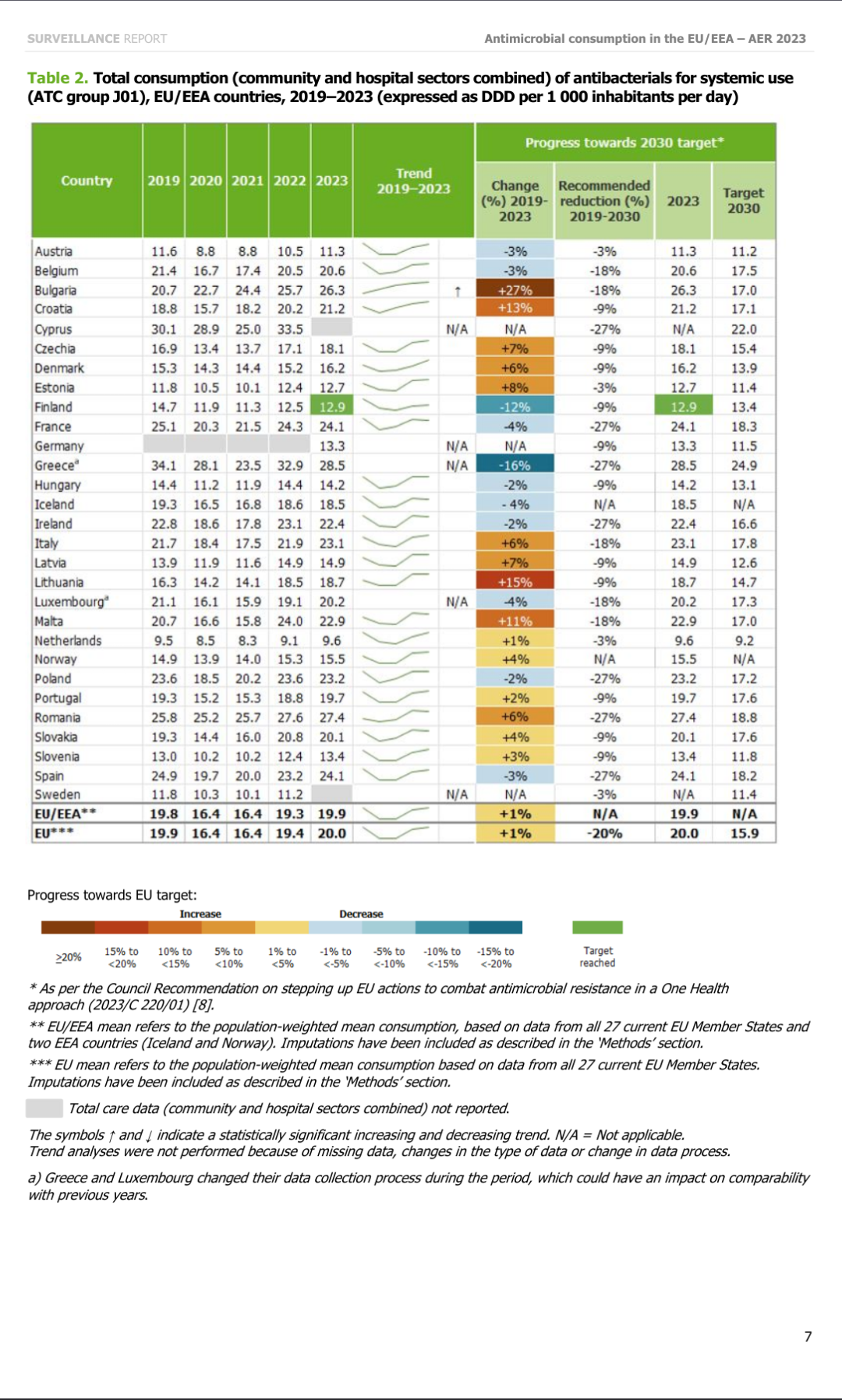

The report in question:
https://www.ecdc.europa.eu/sites/default/files/documents/antimicrobial-consumption-ESAC-Net-annual-epidemiological-report-2023_0.pdf
And the data on usage:

#nobridge


The report in question:
https://www.ecdc.europa.eu/sites/default/files/documents/antimicrobial-consumption-ESAC-Net-annual-epidemiological-report-2023_0.pdf
And the data on usage:



OpenWrt with 802.11r and 802.11s configured will work as a mesh network with roaming functionality.
https://openwrt.org/docs/guide-user/network/wifi/mesh/80211s
https://openwrt.org/docs/guide-user/network/wifi/roaming
Not many Ruckus devices that are supported though:
Brand - Model - Supported Version
Ruckus - ZF7025 - 23.05.2
Ruckus - ZF7321 - 23.05.2
Ruckus - ZF7341 - 23.05.2
Ruckus - ZF7343 - 23.05.2
Ruckus - ZF7351 - 23.05.2
Ruckus - ZF7352 - 23.05.2
Ruckus - ZF7363 - 23.05.2
Ruckus - ZF7372 - 23.05.2
https://openwrt.org/toh/start?toh.filter.supportedcurrentrel=22.03|23.05


Well, most of us can relax I believe: The rootkit supports Linux Kernel versions are 2.6x/3.10.x
https://www.bleepingcomputer.com/news/security/krasue-rat-malware-hides-on-linux-servers-using-embedded-rootkits/


Sam Altman: Ousted OpenAI boss to return days after being sacked
When I switched from Windows to Linux I found cockpit-project.org to be a true blessing when troubleshooting. Something about having logs and services in a Web GUI that can be really helpful.
f.e.: https://cockpit-project.org/images/screenshot/journal.webp
Login to your router or wireless access point and check what devices are connected. Then setup mac adress filtering to improve your security, if you can be bothered to have to add your devices mac adresses manually.
mac adresses are easily spoofed though, so it isn’t foolproof.
I still run everything I can as .rpm through dnf on my Fedora and .deb through apt on my Debian servers.
I only install a flatpak as last resort.
From a dev viewpoint I can understand the gains of flatpak but from a user viewpoint I prefer a “real” install.
If you’re already into self hosting, programming, networking and automation then I don’t think you’ll have any trouble.
With that background you should be able to google the solutions.
Debian offers you 3 variants of Debian:
Debian stable (what you get by default from their homepage). https://wiki.debian.org/DebianStable
Debian testing (has newer packages than stable and breaks less often than Debian unstable). https://wiki.debian.org/DebianTesting
Debian unstable (has the most recent packages and is considered the most fragile of all). https://wiki.debian.org/DebianUnstable
Is miracast an alternative?
https://android.stackexchange.com/questions/252131/cast-on-lineageos-20
Fennec works well


I get your point in dual boot being less of a headache, but learning some libvirt/qemu and running your own virtual machines is a lot of fun.
I went for a virtual Fedora Workstation with VFIO and a dummy plug. Then I use Sunshine/Moonlight to stream my gaming session to whichever device I feel like using.
Anytime I wanna try something I feel might crash my Fedora I simply backup the virtual machine files and go to town on it.
If I fail I roll back and try again.
I run my servers the same way, as virtual machines that I can easily backup and experiment with, and I do think it makes learning a lot quicker.


I didn’t find a way to disable the command but in this discussion they seem to change it to request the root password:
https://github.com/systemd/systemd/issues/2799


Of course it does, how else are they gonna make website owners pay for the data access?


Fennec:
https://f-droid.org/packages/org.mozilla.fennec_fdroid/
F-Droid:
F-Droid is a robot with a passion for Free and Open Source Software (FOSS) on the Android platform. On this site you’ll find a repository of FOSS apps, along with an Android client to perform installations and updates, news, reviews, and other features covering all things Android and software-freedom related.
https://f-droid.org/en/about/


You can probably get around your paypal problems by telling them your Firefox is Chrome.
https://github.com/ray-lothian/UserAgent-Switcher
The place to say no to opt out telemetry isn’t lemmy.world but fedoraproject. A compromise is in the making btw.
https://discussion.fedoraproject.org/t/opt-in-opt-out-a-breakout-topic-for-the-f40-change-request-on-privacy-preserving-telemetry-for-fedora-workstation/85395/425
For a server I would second checking out Debian 12/Bookworm. It has been real solid for me. I run a qemu/kvm/libvirt virtual host and then run my services in virtual Debian servers. Makes them easy to backup and allows me to reboot my Jellyfin server without taking down my Game server and vice versa.
I guess running a container system would be the modern way of doing the same thing.
I imagine we work quite differently then, I couldn’t get used to it at all. I’m also one of the odd ones that prefer the trackpoint to the touchpad.
Cockpit Web GUI made finding and reading logs, restarting services and so on much easier for me as a beginner:
https://cockpit-project.org/
If you use the GNOME desktop then the ArcMenu, Dash to Panel and JustPerfection gnome extensions allow you to simulate the Windows workflow. There’s also many other extensions as better window tiling, showing status indicator at the bottom panel and so on.
https://extensions.gnome.org/
Screenshot example: https://i.imgur.com/tNiFiws.png
Seems so, yes.